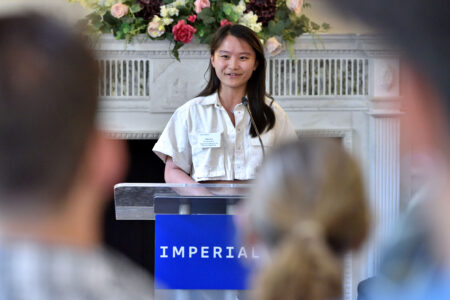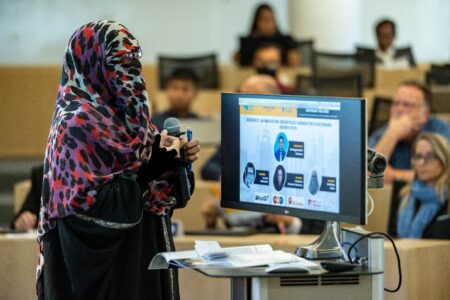
Nestled in Southeast Europe, Kosovo has one of the world’s lowest female labour force participation rates, at around 18%, according to the World Bank Group.
The country’s conservative social norms, individuals only completing lower levels of education, and the limited access to assets and productive input for women are some of the contributors to the high unemployment of women in the labour force.
But Arta Istrefi, a Kosovo national, has been defying the odds.
Growing up in Kosovo, life wasn’t easy for Istrefi.
At six, she faced the devastating loss of her mother. At 12, she experienced the occupation of her homeland by the Serbians from 1998 to 1999. Adding to that, witnessing food deprivation as a result of the war inflicted tremendous trauma on Istrefi.
Despite women being an uncommon sight in the workforce, Istrefi started working as soon as she turned 17 and hasn’t stopped. But that wasn’t all to her making a change in Kosovo — it would only be later on that she would receive a full scholarship to attend the nation’s University of Prishtina for a Bachelor’s in Banking, Finance, and Accounting.

While not an easy task, Istrefi is giving it her all to make a change in Kosovo. Source: Arta Istrefi
Coming from a family who believes in education
“One thing was clear in my family,” says Istrefi. “It’s hard love, education and work.”
As someone who came from a family of doctors — her parents and four sisters studied medicine — Istrefi and her brother took a different route instead, choosing to pursue the fields of economics and law, respectively.
“I was an outlier but was recognised and supported by my family,” she says.
However, her hard work and passion got her through the differences.
At 24, Istrefi became an advisor to Kosova’s Ministry of Industry, Entrepreneurship, and Trade, who happened to also be the Deputy Prime Minister of Economy.
“This was one of the experiences that, at 24, you kind of go, wow, you see the world in a different light. I remember sitting with the ministers, not just in Kosovo but internationally, and meeting with very high representatives from other developed or developing countries,” says Istrefi.
“We were involved in critical decision-making systems in policy making. This was also the moment that Kosovo implemented many changes to the digitalisation system for the Ministry of Trade and Industry.”
Between learning about politics and economics at the ministry and her father’s instillation of the value of education and continuous learning, Istrefi ended up pursuing a master’s degree shortly after her work there.
The master’s degree in question — earned through the Chevening Scholarship — was an MSc in Economic Development and Policy Analysis at the University of Nottingham.

Istrefi is passionate about community building, women’s empowerment, and leadership. She’s dedicated to making a positive impact. Source: Arta Istrefi
Preserving in the face of grief and heartbreak
Istrefi credits her father to be the driving force behind her preservation and her pursuit of education.
“My father’s synonymous with education. He always wanted us to be highly educated, and his wish was for me to finish my master’s and PhD. A wish well achieved now,” she says.
Like Istrefi said, she jetted off to the UK, excited to start this new journey.
But three days after she arrived in the UK for her master’s, her father passed away.
Two choices were before her then: dropping out of her master’s programme and giving up the hard-earned scholarship, or pushing through the grief and fulfilling her father’s wishes for her.
She chose the latter, determined to do her dad proud.
“I had to get myself together,” says Istrefi. “I can cry and get worried, but it won’t bring my dad back.”
“I tried to do my best so that I can always perform, be a good student, a kind person, and everything because my story would not necessarily mean that people would feel empathy or that I have to victimise myself because of what happened.”
Making a change back home
After completing her master’s, Istrefi returned to Kosovo and entered the private sector as a consultant. In addition to her career, she joined EMPOWER Private Sector, financed by USAID, which works with and supports rape victims of the Kosovo war, as well as women from marginalised groups at other organisations.
It is estimated that 20,000 Kosovar women were raped by Serbian soldiers and police during the conflict, said a public hearing.
While on the project, Istrefi would meet the women in person and hear their stories. “It was the most sensitive and hardest project I led, but I’m happy the President of Kosovo’s office joined forces and exemplified it. They created more jobs in one of the towns we supported,” she says.
As of today, 1975 jobs have been created, 875 of which were for women and 940 for youth. The jobs include women running businesses and producing accessories sold in Kosovo and abroad.
Istrefi comments, “I participate in the advisory on how prices of the products, how to sell them, and the strategy of how to get the women involved in not only making them but socialising to sell the products and make money out of it.”
Her efforts to help the women in her local community and inspire them to start businesses have driven her to found her own organisation, Women Entrepreneurs Kosovo.
That’s not all — Istrefi is supporting other women through Narwhal Network as a co-founder and Chief Growth Officer. At Narwhal, they match fractional job opportunities for highly skilled women and men with companies. This is specifically important for women as it offers flexibility and work-life balance.
“I am on a mission to empower women in different sectors,” says Istrefi. “Business is very uncommon for women, especially in Kosovo. And to me, the most powerful tool a woman can have is financial independence. Once they have that, they can do whatever they want without being stuck in their condition. This is my forever mission to contribute.”










